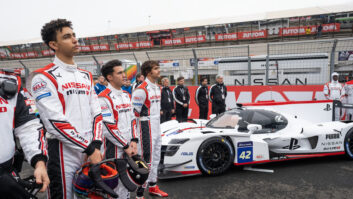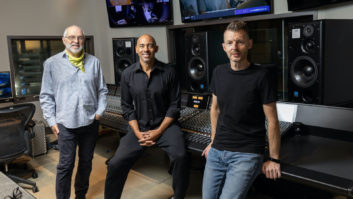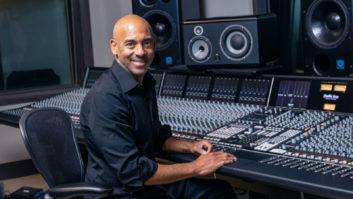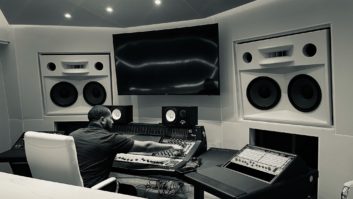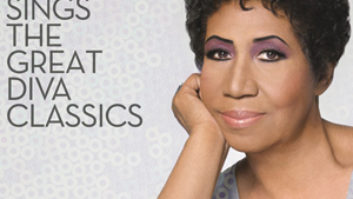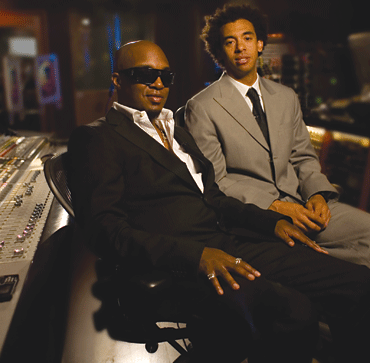
When Harvey Mason Jr. and Damon Thomas first joined forces seven years ago, they brought together their respective credentials as songwriters and producers for Rodney Jerkins and Kenneth “Babyface” Edmonds. That session launched the two-man operation The Underdogs. Now, as Underdog Entertainment, their company encompasses Underlab Studio, with eight rooms manned by four engineers (Dabling Harward, Aaron Renner, Riley Mackin and Ruben Rivera); a record label with Clive Davis (upcoming releases include Underdogs signings Luke & Q, two R&B singers from New Orleans and Grrlfriend); and Underdog Music Publishing. They are also producing songs for upcoming albums by Jennifer Hudson, Whitney Houston and Chris Brown.
Mason and Thomas have worked with a roster of top artists too numerous to mention. Among them are Justin Timberlake, Kelly Clarkson, Toni Braxton and Pink. (For more credits, see “Selected Credits” on page 78.) Their cumulative projects equal album sales topping 50 million. Suffice to say that, if it’s a hit, Mason and Thomas are probably involved. Last year, Dreamgirls director Bill Condon brought the two onboard to arrange and produce the movie soundtrack. Three songs from the film — “Listen,” “Love You I Do” and “Patience” — garnered Academy Award nominations in the Best Original Song category, a first in the production world. And while the Dreamgirls soundtrack sat comfortably at Number One on the album charts, The Underdogs also charted seven other songs during that same week.
Mason and Thomas make an interesting pair: focused, driven, genuinely humbled by their success, but with admittedly different personalities. They eschew individual interviews, preferring to tag-team. That said, Mason is the front man and Thomas is the quieter half of the duo, listening carefully and contributing periodically.
How did you become involved in the Dreamgirls project?
Mason: We had an initial meeting with Bill Condon, the director, and Henry Krieger, the original composer. They were trying to find someone to help them write some new songs for the movie. This was about three years ago. We didn’t know much about the music, so it didn’t work out. A year later, Bill and two music supervisors approached us for a meeting to listen to the music from the original [stage musical], listen to ideas for the new version and talk strategy. At the end of the meeting, they asked if we were up for redoing the music, and we said, “Of course.”
What were the biggest challenges while recording the soundtrack?
Mason: It was twofold. One, to try to make sure we pleased all the cooks in the kitchen. With a movie project, there are a lot more people you get input from: the director, music supervisors, studio executives, the cast, the choreographer. We were trying to pick our way through what information to take to heart and what was just opinions. We ended up having a good relationship with Bill and following his lead.
Two, how far to update the music and push the creative envelope in how the songs should sound. We didn’t want fans of the original to be angry, and we didn’t want to leave them suffering with the exact same songs. And we wanted the Underdog Entertainment audience to listen to it and say that it sounds like what they like.
How was Dreamgirls different from the projects you’re used to doing?
Mason: Ultimately, when we’re done with our records, we interact with record company presidents and we’re used to dealing with Clive [Davis], so it’s a partnership to make something really hot and still make someone’s record and hope that it’s what they want. And in this case, that it would be what Bill wanted.
Did you have any idea that Dreamgirls would take off the way it did?
Mason: We had an idea that it would be big when we looked at the cast. It’s an amazing project with an amazing story, but we were unsure of how to pull it off to be a musical, where usually you see a guy walking down the street and he breaks into song. Bill had a creative way to go into every song — a concert, a rehearsal, a writing session; there’s a reason for all the songs. It made things better for us. We try to involve ourselves in great things, and this was another perfect opportunity to do what we love and showcase what we do best, which is to make good music.
In 2003, you said, “We want to leave our mark on the industry and have people like and respect us.” You have certainly surpassed the goals you set for yourselves.
Mason: We’ve put good music on the radio and in theaters, and we still have a long way to go.
Thomas: Big goals. The people we look up to — like Quincy Jones, Babyface, David Foster — they’re still going, and we’re still trying to make it to that level.
Mason: Those are the types of producers we aspire to be. We still have a lot of great songs in us to write. We’ve been very fortunate and pleased with our path to success and we’re not discounting or downplaying it. We are thankful, not greedy. We just want to improve and continue to do more good work.
How do you balance each other as a team? What are the differences and similarities that make it work?
Thomas: The only similarity is the music. We love a lot of the same things. We’ve been together for seven years and we’re different in a lot of ways, and that’s why it works. We both play, write, do everything, so it’s not like one person does and the other doesn’t.
Mason: We balance each other out because of mutual respect. No one has the determining decision on how to make a record; it’s a balance of one does something and the other counters it until we get to the end result, and that’s in music, vocals, lyrics, how we mix, the interviews we do. It’s a constant balance of partnership. And we get along. Otherwise, it would be a power struggle. Damon is a lot wilder and I’m a lot more conservative. He’s more adventurous musically, so he balances me musically. Businesswise, he’s wilder; I’m more conservative. Clothing, he’s wilder and I’m more conservative!
You’ve remained loyal to the SSL C200 and you’re obviously Mac lovers. Why these particular pieces of gear?
Mason: We’re five years in with the C200. It starts with the sound: The sound is incredible. It’s superflexible for working on multiple projects at the same time. All day, we’re pulling things up from the seven other rooms, and we have the freedom to work on all these projects, the mixes and the recalls. The sound and ease make it invaluable. All the rooms have Logic on G5s, Pro Tools on G5s synched together. We do all the MIDI programming and tracks in Logic, record all the live instruments and vocals in Pro Tools. We have always done that; we haven’t changed.
We use a Sony C800G mic, always have, on 95 percent of voices. It sounds the best to us for the way we like our vocals to sound. It’s very accurate, with a clear high end. That mic stacks really well, and we stack a lot of vocals. We use a lot of Avalon outboard and mic pre’s and EQ. Other than that, it’s pretty streamlined. The Motif keyboard is our only outside sound. All the things we use are all flexible. We’re constantly upgrading our sound and plug-ins, effects and EQs. Revisions are done on the console, so we keep stuff fresh for new sounds and creativity.
Thomas: Using our console for Dreamgirls was very useful because we could recall stuff so quickly.
Mason: There were 61 pieces of music for that film and we could push one button to recall something.
Looking back on some of your earliest projects, how have you grown and perfected your craft over the years?
Mason: We were pretty competitive in the early stages and making good records, but the sounds and styles have changed. We came from similar backgrounds and joined forces to put two halves of a brain together to make one brain. You always try to perfect your craft and keep your songs sounding better.
Anyone with a computer and Pro Tools can make a record in their bedroom now and sell it online. Were you among the last generation to come up through the ranks, working with people like Babyface and Rodney Jerkins? Do you think that kids today are missing out on that invaluable experience?
Mason: I think that’s very true, but they can be as competitive and good as someone who did it our way of coming up with other people. It’s about who makes the coolest record, and do people like it and want to hear it? The beauty of making music is that if you have a computer, you can make a record.
Thomas: Harvey and I were among the first guys to use Pro Tools fully, while others were using Sony digital machines. We did it before other people were thinking about it.
How have the Underdog Entertainment facilities expanded?
Mason: We started in a house with a studio in the corner of a room, combined our equipment, went to a commercial studio we leased for a year and we’ve been here for five years. We have a publishing company, we’ve signed writers and producers, and it’s not cost-effective to try to rent rooms, so we built this to be our home base. Damon is in one room, I’m in another, somebody is cutting vocals, somebody is overdubbing. We had to have this to complete the plan we had in mind: production, recording and publishing companies all running at the same time and being efficient and productive. People see the amount of work and hours we put in and feel the energy. Everybody here is excited and passionate about making music. But we didn’t go out like a lot of young producers, and say, “We’re going to start a studio and build a camp.” We did it ourselves — writing and evolving, not just jumping into it.
What are the advantages of being a one-stop shop? Are the stress levels overwhelming at times?
Mason: We’re having fun. We all like each other and challenge each other, but it’s not a stressful job. It’s long hours and a lot of hard work and being focused for long periods of time, but it’s not hard.
As songwriters, musicians and producers, how do you keep from overstepping your boundaries?
Mason: That’s a tough question. I guess we’re not so good at setting boundaries. Maybe we do. You do what you think is right. We don’t get boundaries. The artist comes in, you do your homework, set up where you want to track them, do something fresh. Sometimes you have to push the boundaries.
What are you listening for in the song as it is written, as the singer is tracking it and as you’re producing it?
Thomas: It’s different, because we are the musicians sometimes. When we’re writing, we start with chord progressions, and Harvey or myself will create a track around it and a concept, then a lyric. Then we get a vocalist, and it’s kind of easy from there.
Mason: It’s very personal, the way we make records. So it’s very simple: We listen for things we like. We respect our writers’ opinions. Vocally, we listen for things that move us and make us believe in the song, get an emotional reaction and performance that showcases artists and makes them look great. Production — again, we look for something we like, something cool, new and fresh.
Where did you gain your sense of what works?
Mason: We didn’t, and that’s what people don’t understand sometimes. What we know is what we like, and what we like right now is what’s working. Our idols, L.A. [Reid] and Babyface, knew what they liked, and at the time, radio and people liked it, so it sells. Great people don’t study what works and try to do that. They do what they like. You can try to fake it and chase it, but to try to do what others do is not personal. We make music we like, and if people like it, it will work. If we fall out of favor, we’ve lost our timing or our connection with what works.
Is there an “Underdogs” sound? Is that possible, given the range of projects and artists that you work with?
Mason: If you’re a true student of The Underdogs way, you can find it. Patterns we use in drums, bass lines, all our songs, we take pride in making sure are musically sensible and the structure is hopefully acceptable. Vocally, if you listen closely, there’s consistency in the artists’ vocals and harmonies. Most all of our records have cool bridges. Our mixes sound fairly consistent. You do have to be savvy to pick up on some of it, and certainly Mix readers are savvy enough to do that.
How do you repeat the success of that sound, but still make it new and not have it all sound the same?
Mason: It’s the way we do things. Our sound doesn’t come from us trying to make a sound; it comes from our likes and dislikes. It happens naturally, and so it comes out in every record one way or another, and as we change and evolve, our personal tendencies always follow us. We can change all the patterns and structures we want, but what sounds good to our ears will always follow us.
Elianne Halbersberg is a freelance writer.
Selected Credits
Babyface:
Grown & Sexy‘s “The Loneliness” and “Can’t Stop Now” (2005)
Toni Braxton:
Libra‘s “Finally,” “I Hate You,” “I Wanna Be (Your Baby)” and “Sposed to Be” (2005)
Kelly Clarkson:
Thankful‘s “Thankful” and “You Thought Wrong” (2003)
Coyote Ugly soundtrack (2000)
Fantasia:
Free Yourself‘s “Ain’t Gon’ Beg You,” “This Is Me” and “You Were Always on My Mind” (2004)
Jamie Foxx:
Unpredictable‘s “Creepin’” (2005)
Michael Jackson:
Invincible (2001)
Josie:
Unkunvenshunal Girl (2000)
Jennifer Lopez:
On the 6 (1999)
Brian McKnight:
U Turn‘s “Shoulda Woulda Coulda” (2003)
Mya:
Fear of Flying (2000)
Tupac Shukar:
Still I Rise (1999)
Will Smith:
Willennium‘s “Who Am I” (1999)
Britney Spears:
Oops!…I Did It Again (2000)
Spice Girls:
Forever (2000)
Ruben Studdard:
The Return‘s “Change Me” and “Get U Loose” (2006)
Justin Timberlake:
Justified‘s “Still On My Brain” and “Rock Your Body” (2002)
Tyrese:
2000 Watts’ “I Like Them Girls” (2001)
